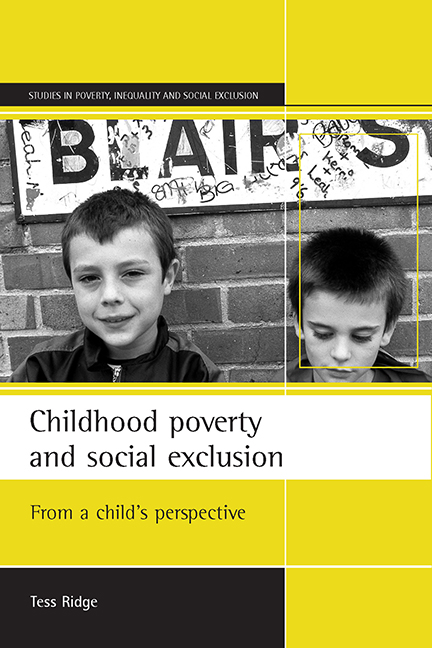Book contents
- Frontmatter
- Contents
- List of tables and figures
- Acknowledgements
- one The challenge of child poverty: developing a child-centred approach
- two What do we know about childhood poverty?
- three Children’s access to economic and material resources
- four ‘Fitting in’ and ‘joining in’: social relations and social integration
- five Family life and self-reflection
- six Experiences and perceptions of school: analysis of the BHPYS data
- seven Childhood poverty and social exclusion: incorporating children’s perspectives
- References
- Appendix BHPYS Wave 7
- Index
six - Experiences and perceptions of school: analysis of the BHPYS data
Published online by Cambridge University Press: 20 January 2022
- Frontmatter
- Contents
- List of tables and figures
- Acknowledgements
- one The challenge of child poverty: developing a child-centred approach
- two What do we know about childhood poverty?
- three Children’s access to economic and material resources
- four ‘Fitting in’ and ‘joining in’: social relations and social integration
- five Family life and self-reflection
- six Experiences and perceptions of school: analysis of the BHPYS data
- seven Childhood poverty and social exclusion: incorporating children’s perspectives
- References
- Appendix BHPYS Wave 7
- Index
Summary
The three previous chapters focused on qualitative data, which explored how children and young people from low-income families see their home and school lives, and their social and familial relationships. This chapter seeks to build on that knowledge and to develop a wider understanding of children's and young people's lives through a comparative analysis of large-scale survey data. This provides an opportunity to explore the differences between children and young people who are living in low-income families with those who are living in families with adequate incomes. The chapter is based on analysis of data from the 1997 British Household Panel Youth Survey (BHPYS). The data is used to explore children's experiences and perceptions of school life. Throughout the chapter the analysis is underpinned by a key question:
• Do children in the Survey, who are living in households in receipt of meanstested benefits, differ from children living in households that do not receive benefits, in their experiences and perceptions of school life?
An essential part of children's and young people's lives is spent in the school environment, and the importance of disadvantaged children's academic performance for their future well-being and employment prospects is considerable (Gregg et al, 1999). However, as we have seen from the qualitative study, children's perceptions of school life and their everyday experiences of school life are also an integral part of developing an equitable and inclusive academic environment. The current Labour government has made a strong policy commitment to improving the educational prospects of disadvantaged children (DfEE, 1997), and policies have been put in place to tackle a range of issues, including literacy, numeracy, truancy and school exclusions (DSS, 1999a). We have seen from the qualitative study that children from low-income families have particular concerns about the quality of school life they are experiencing, and their opportunities to ‘fit in’ and join in with the opportunities available to their peers at school. In this chapter we will draw on a large sample of children and young people to develop a comparative insight into a range of school issues, including children's experiences of school, their perceptions of their teachers and the role their parents play in their academic lives.
- Type
- Chapter
- Information
- Childhood Poverty and Social ExclusionFrom a Child's Perspective, pp. 111 - 130Publisher: Bristol University PressPrint publication year: 2002



